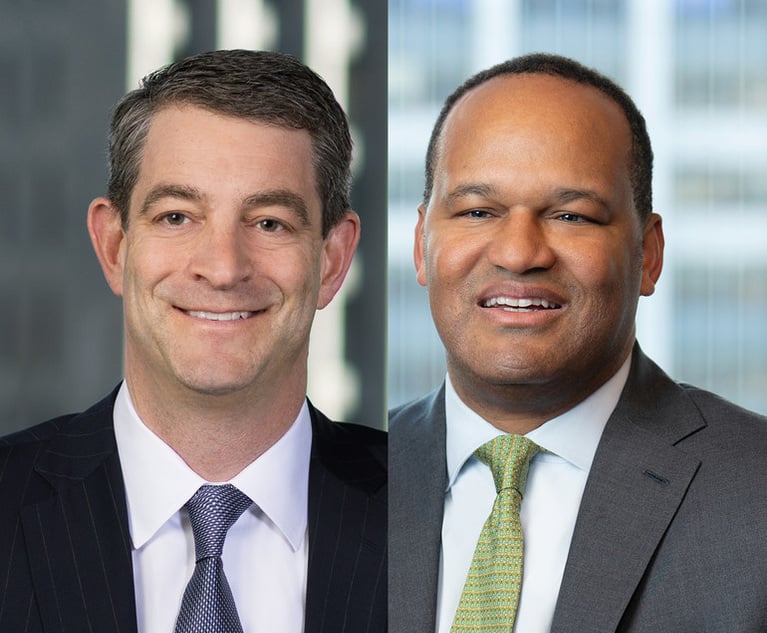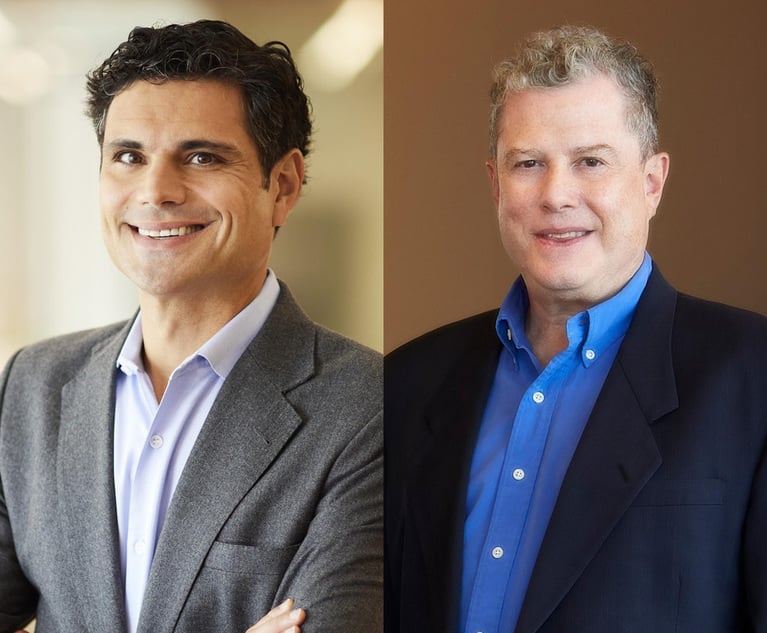Under the Radar, Brokers Ride the Litigation Finance Tide
While the most visible operators serve clients looking to navigate an opaque funding market, others are cold-calling litigators and earning their commissions from funders desperate to deploy capital on good cases.
December 02, 2019 at 05:00 AM
5 minute read
 Photo: Shutterstock
Photo: Shutterstock
Even though Susman Godfrey partner Shawn Rabin works for a firm with four decades of experience making a contingency-based commercial litigation practice work, his phone line is buzzing with entreaties from litigation funders.
The industry has an estimated $9.5 billion in assets under management in the United States, according to a recent study, and that capital needs to find a home. Consequently, funders are tracking PACER for fresh filings and reaching out to litigators with promising cases. And third parties are getting in the mix, too—litigation finance brokers aiming to connect claimaints to funders and vice versa.
"One of the reasons we're hearing more in outreach from the actual funders and outreach from brokers is that the market's being flooded," Rabin said.
With some brokers drawing commissions directly from funders, according to Rabin, these players are just as aggressive in their cold calling.
"That's forcing litigation funders to double up their efforts," Rabin added.
Not all brokers are putting their energy into soliciting lawyers. Nashville-based Westfleet Advisors, founded in 2013, is likely the most visible broker in the U.S. market. That's in part because of its work surveying several dozen funders in order to produce a report on the industry that included the $9.5 billion estimate along with several other telling data points about the deployment of litigation finance.
"We're always paid by the client side of the deal, whether it's a law firm or the company," said Westfleet managing partner Charles Agee III.
Agee acknowledged that other brokers in the marketplace do earn their fees from funders. But the impact on the client is the same, even if the arrangements are invisible. The broker's share is simply rolled into the pricing.
"There's no free lunch," he said.
U.K.-based broker ClaimTrading Ltd., founded in 2011, operates in a similar fashion. The outfit, which focuses primarily but not exclusively on matters in international arbitration, is retained by claimants, who agree to pay the fees that are then typically included in the formal funding agreement, said managing director Maddi Azpiroz.
Both Azpiroz and Agee said they serve clients through their ability to cast light on what continues to be an opaque process, directing particular matters to the most appropriate funders.
"Our goal is to give the claimants a good view of what's available in the market," Azpiroz said. "It's not the most transparent market, but we try to make it as user-friendly as possible."
Likewise, Agee believes that there are some funders that Westfleet is not eager to expose its clients to, while others are only a fit for particular circumstances.
"It really depends on what the deal and the case and the structure of the transaction is," he said. "We try to understand what the particular funder's appetites and preferences are."
While their counterparts in the securities industry are obligated to register with the U.S. Securities and Exchange Commission, litigation finance brokers face no such obligation.
"It's for the same reasons that funders don't have to register as lenders or be regulated as capital providers," Agee said. "All litigation finance transactions are contractual in nature. There are contractual obligations for funders to provide funding and contractual obligations for counterparties to make payments."
Consequently, it's impossible to arrive at even an estimate of how many brokers are operating in the marketplace, with many keeping a very low profile online. There are no registration requirements in the U.K., either. But the Association of Litigation Funders, an independent body tasked with self-regulating the industry in England and Wales by the Ministry of Justice, imposes some degree of oversight. ClaimTrading and several other London-based brokers are members.
In the absence of any oversight, some brokers are holding themselves out to clients as actual funders, even if they don't have direct access to capital. Litigation funder Legalist, which did not make a representative available to comment, warns potential claimants of the practice on its website: "The easiest way to quickly recognize a broker is to ask if they control their own capital for making investments. Anything other than a clear, resounding 'yes' is a likely indication that the company is a broker who will take your claim details and refer them to actual litigation funders."
Even in the U.K., with the oversight of the ALF, that's an issue, said Azpiroz, who emphasized that ClaimTrading has committed since its founding to be transparent to claimaints about its lack of direct access to funds.
But Rabin believes that further regulation is likely, not because of misrepresentations by brokers but simply because of the larger issue confronting the industry: investors embracing litigation finance because its anticipated returns are not correlated to the stock market and related investments. Most ethically slippery activity can be traced to that influx of capital, as can bad choices by funders themselves.
"They just have too much money to deploy," Rabin said. "If there are not enough good cases to deploy it on, they're going to deploy it on bad cases. Then investors are going to lose their shirts."
That's when the real regulatory scrutiny is going to arrive.
Read More
Amid Buyers' Market, Litigation Funders Find Traction With Smaller Firms
Litigation Finance Users Say They'd Do It Again, Survey Finds
Steve Susman to Litigation Funding Industry: Bring It On
This content has been archived. It is available through our partners, LexisNexis® and Bloomberg Law.
To view this content, please continue to their sites.
Not a Lexis Subscriber?
Subscribe Now
Not a Bloomberg Law Subscriber?
Subscribe Now
NOT FOR REPRINT
© 2025 ALM Global, LLC, All Rights Reserved. Request academic re-use from www.copyright.com. All other uses, submit a request to [email protected]. For more information visit Asset & Logo Licensing.
You Might Like
View All
'None of Us Like It': How Expedited Summer Associate Recruiting Affects Law Students and the Firms Hiring Them

Latham's Lateral Hiring Picks Up Steam, With Firm Adding Simpson Practice Head, Private Equity GC
3 minute read

Leaning Into ‘Core’ Strengths, Jenner’s Revenue Climbs 17%, Profits Soar 23%
4 minute readLaw Firms Mentioned
Trending Stories
- 1Thursday Newspaper
- 2Public Notices/Calendars
- 3Judicial Ethics Opinion 24-117
- 4Rejuvenation of a Sharp Employer Non-Compete Tool: Delaware Supreme Court Reinvigorates the Employee Choice Doctrine
- 5Mastering Litigation in New York’s Commercial Division Part V, Leave It to the Experts: Expert Discovery in the New York Commercial Division
Who Got The Work
J. Brugh Lower of Gibbons has entered an appearance for industrial equipment supplier Devco Corporation in a pending trademark infringement lawsuit. The suit, accusing the defendant of selling knock-off Graco products, was filed Dec. 18 in New Jersey District Court by Rivkin Radler on behalf of Graco Inc. and Graco Minnesota. The case, assigned to U.S. District Judge Zahid N. Quraishi, is 3:24-cv-11294, Graco Inc. et al v. Devco Corporation.
Who Got The Work
Rebecca Maller-Stein and Kent A. Yalowitz of Arnold & Porter Kaye Scholer have entered their appearances for Hanaco Venture Capital and its executives, Lior Prosor and David Frankel, in a pending securities lawsuit. The action, filed on Dec. 24 in New York Southern District Court by Zell, Aron & Co. on behalf of Goldeneye Advisors, accuses the defendants of negligently and fraudulently managing the plaintiff's $1 million investment. The case, assigned to U.S. District Judge Vernon S. Broderick, is 1:24-cv-09918, Goldeneye Advisors, LLC v. Hanaco Venture Capital, Ltd. et al.
Who Got The Work
Attorneys from A&O Shearman has stepped in as defense counsel for Toronto-Dominion Bank and other defendants in a pending securities class action. The suit, filed Dec. 11 in New York Southern District Court by Bleichmar Fonti & Auld, accuses the defendants of concealing the bank's 'pervasive' deficiencies in regards to its compliance with the Bank Secrecy Act and the quality of its anti-money laundering controls. The case, assigned to U.S. District Judge Arun Subramanian, is 1:24-cv-09445, Gonzalez v. The Toronto-Dominion Bank et al.
Who Got The Work
Crown Castle International, a Pennsylvania company providing shared communications infrastructure, has turned to Luke D. Wolf of Gordon Rees Scully Mansukhani to fend off a pending breach-of-contract lawsuit. The court action, filed Nov. 25 in Michigan Eastern District Court by Hooper Hathaway PC on behalf of The Town Residences LLC, accuses Crown Castle of failing to transfer approximately $30,000 in utility payments from T-Mobile in breach of a roof-top lease and assignment agreement. The case, assigned to U.S. District Judge Susan K. Declercq, is 2:24-cv-13131, The Town Residences LLC v. T-Mobile US, Inc. et al.
Who Got The Work
Wilfred P. Coronato and Daniel M. Schwartz of McCarter & English have stepped in as defense counsel to Electrolux Home Products Inc. in a pending product liability lawsuit. The court action, filed Nov. 26 in New York Eastern District Court by Poulos Lopiccolo PC and Nagel Rice LLP on behalf of David Stern, alleges that the defendant's refrigerators’ drawers and shelving repeatedly break and fall apart within months after purchase. The case, assigned to U.S. District Judge Joan M. Azrack, is 2:24-cv-08204, Stern v. Electrolux Home Products, Inc.
Featured Firms
Law Offices of Gary Martin Hays & Associates, P.C.
(470) 294-1674
Law Offices of Mark E. Salomone
(857) 444-6468
Smith & Hassler
(713) 739-1250










